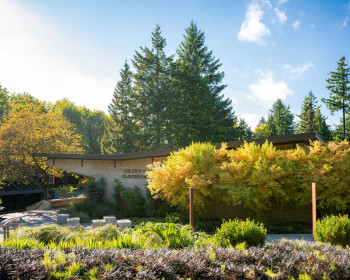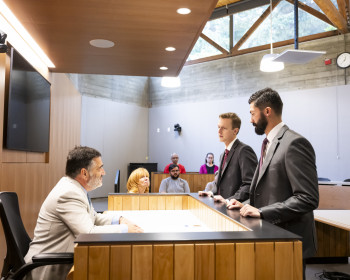Glenda Valdez
The niche courses here allow students to understand environmental law at a level unique compared to other institutions.

Degree and Class Year
Hometown
Undergraduate/Graduate School(s)
Areas of legal interest(s)
Brief Background
I grew up in northern Michigan and Minnesota, and then I went to the University of Wisconsin-Madison as an undergraduate. Following graduation, I moved to D.C. for a federal internship at the Department of Interior. After that, I secured a position as a science education analyst at the National Science Foundation in the Division of Undergraduate Education. There I gained exposure to the functions of the executive branch in terms of seeing how national policy is formed and how agencies with similar missions collaborate and interact with the legislative branch. Within my division, the thrust of many of our programs was to increase representation of underserved communities in STEM higher education. What struck me was that many of the communities that face barriers to higher education are the same communities that face environmental injustice. This experience helped me to think about the multiple factors at play when considering what it means to make change and the interconnectedness of issues facing society. Now that I am in law school, I have had a couple of “aha” moments, one of which was when it dawned on me that I had experience in statutory interpretation without realizing it at the time. One of the STEM education programs I worked with was authorized in the U.S. code. In writing and carrying out the program solicitation, we had to draw from the statute to give meaning to the program structure. Lesson learned from this experience: don’t sell yourself short, you probably know more than you think!
List up to three activities (school-related or not) that you are involved in. Why are they most important to you?
- Running: Going outside for a run is one of the most important things I do for self care. Long runs help me to think through things and reduce my anxiety. Also, running is a great way to get to know a new neighborhood!
- Volunteering: Prior to law school I was a docent at the Insect Zoo at the National Museum of Natural History where I taught visitors about the metamorphosis of the tobacco hornworm and the feeding habits of the tarantula (not an insect!). Now at L&C I have been able to volunteer with the Latinx Law Society (LLS) and Women in Criminal Law (WICL) by serving as a mock interviewer to help students prepare for upcoming interviews. I have also had the opportunity to serve on the board of the Northwest Environmental Defense Center and worked on projects with the public lands and environmental justice committees.
- Baking/bakeries: I love croissants, cookies, and basically anything buttery with a crunch. One of my favorite recipes is oat and tahini cookies, they include orange zest and a dark chocolate drizzle. In Portland, the rose croissants at Nuvrei or coffee from La Perlita are great treats after a study session.
Why did you choose to attend Lewis & Clark?
I chose to attend Lewis & Clark because of the wide array of environmental courses available to students. I was encouraged by a conversation with Janice Weis, associate dean and director of the environmental, natural resources, and energy law program, who spoke about the environmental curriculum at Lewis & Clark and mentioned classes like Natural Resources Law and Public Lands and Resources Law. My interest was captured by the opportunity to learn about statutes like the Endangered Species Act from different vantage points. The niche courses here allow students to understand environmental law at a level unique compared to other institutions.
Do you have any bits of advice for students making their final law school choices?
There are many considerations, and how you weigh each is ultimately up to you! What is the best choice, well … it depends! (A phrase you will grow to have a love/hate relationship with after your first semester of law school.) I would consider the specialties the school is known for, the opportunities to get practical experience through clinics in your interest area, cost of attendance, bar pass rate, and location.
More Admissions at Lewis & Clark Law Stories
Law School Admissions is located in Gantenbein on the Law Campus.
MSC: 51
email lawadmss@lclark.edu
voice 503-768-6613
fax 503-768-6793
toll-free 800-303-4860
Law School Admissions
Lewis & Clark Law School
10101 S. Terwilliger Boulevard MSC 51
Portland OR 97219

